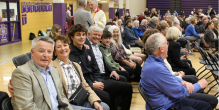Dr. Kendra Harris '09 Pursues Justice Through Medicine
Reprinted from Traditions, Winter 2021-22
April 27, 2022
In 1927, a baby was born in rural Minnesota, blue and unable to breathe. A midwife wrapped her in a blanket and submerged her in the snow, kickstarting her breathing. Nearly a hundred years later, that baby’s granddaughter, Dr. Kendra Harris ’09, is learning somewhat more advanced techniques.
Harris is currently an Obstetrics and Gynecology (OB/GYN) resident at the Mayo Clinic, a specialty she chose because of the overlap between medical care and social justice.
“A Privilege and an Honor”
“A nation’s wealth is directly correlated to the education and health of women,” she explained. “If you raise healthy, strong women who are educated, you raise strong communities.”
“OB/GYN is the medical field that has the most natural space for social justice, which is what I wanted most in my career,” continued Harris. “That fire for social justice was sparked by CDH and all the volunteering we did and the focus on the community.”
As one of the few surgical specialties where you can have lifelong relationships with patients, the OB/GYN field is a varied one. In her residency, Harris is learning about childbirth and wellness exams, but she is also learning about performing hysterectomies, cancer treatment, bowel resection, and of course developing a positive relationship with a patient who is going through something scary and is feeling vulnerable.
“When I walk in to meet a patient and begin an exam, it’s really a privilege and an honor,” she said. “Specifically, it takes trust. We talk about very personal topics, and many of the people I see have experienced trauma in the past, so I feel privileged that they trust me.”
Foundations for Her Future
Not surprisingly, science was Harris’ favorite subject in high school, but she also developed a special relationship with CDH English teacher Sheila Malone-Povolny.
“I have to give a shout out to Ms. M-P,” she said. “She has volunteered to edit my application essays — for college, medical school, and for my residency. And as I go on to my fellowship, hopefully she’ll help edit this one. Even more than a decade out, I can still go back to my CDH teachers for insight and help.”
Harris, who played a different sport every year at CDH, is comfortable putting herself in situations where she is challenged and learning from those with more experience. Her co-curriculars also prepared her for failure, and for getting up and moving on if things go wrong.
“High school athletics taught me how to take feedback in the moment and not fall apart, which obviously you can’t do in the middle of a surgery. My commitment to the sport meant that I couldn’t just quit midseason. I learned to find joy even when things became hard,” she reflected.
A Lifelong Learner
After high school, she attended Wesleyan University in Middletown Connecticut, and then Meharry Medical College in Nashville, Tennessee, one of three historically Black Medical Schools in the United States.
“I chose Meharry because of the similarities to both CDH and Wesleyan — it felt like a family, and the teachers took the time to get to know me as an individual. I also chose it for the differences. As a biracial woman, attending Meharry was supportive in a unique way. They taught me how to walk into a room as a Black physician and establish good rapport with my patients. And just like at CDH, I made lifelong friends and met educators and professors who I know continue to support my growth.”
Harris sees herself as a lifelong learner, a trait that is a requirement in the medical field, where best practices are constantly being updated.
“If you want to provide your patients with the best care, which I work to do, you practice medicine with facts and scientific evidence,” Harris said. “I realized when I started my Mayo residency that there are people who have spent thousands of hours researching this field, and thousands of patients who have had things go really well or really struggled. It’s important to me that I honor that.”
Harris has a year of residency left and is planning to further specialize through a fellowship. Long term, she hopes to practice in a system where she can both provide clinical and surgical care, while also mentoring younger doctors.
“There’s always someone that’s older than you or wiser, who knows a little more or has made more mistakes that you can learn from. In medicine, it’s so important to rely on that shared knowledge and experience, and I’m looking forward to passing on that same level of support to other new doctors.”
Subscribe to our e-Newsletters
You might also like:
Two Brothers Earn Eagle Scout Rank, Continuing a Family Legacy
Isaac Andrzejek ’25 and Joseph Andrzejek ’27 have earned the rank of Eagle Scout, joining their three older brothers in achieving Scouting’s highest honor.
Grandparents Mass Welcomes Over 700 Guests
Cretin-Derham Hall’s annual Grandparents Mass welcomed over 700 guests for a celebration of faith and family.
Student Awards Ceremony Recognizes Outstanding Junior and Senior Students
Junior and senior students received well-deserved recognition at the Awards Assembly on Monday, April 28.




